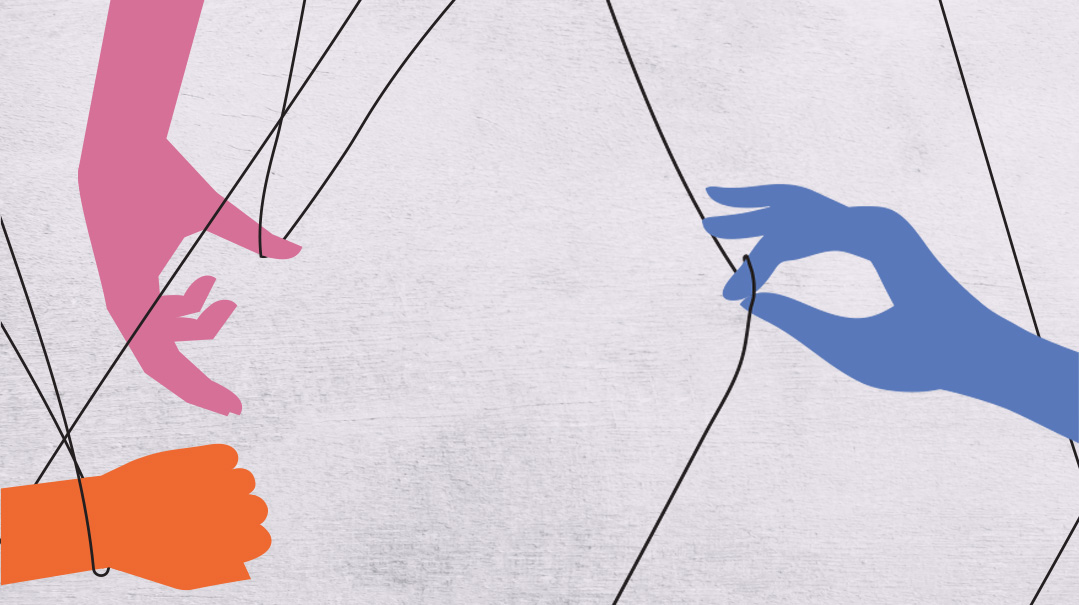Lie of the Land: Chapter 1
| June 9, 2024“Are you all right?” someone else asks. A teenager has her phone out and is filming her humiliation

On the day that Rivi Greenberg finds out that her father is dead, she is imprisoned by her own sheitel in the middle of Madison Avenue.
It doesn’t come off. That’s her sole comfort.
Every workday, Rivi wears a wig, perfectly set and styled in businesslike waves; indistinguishable from her colleagues’ hair unless you know what to look for. When she strides through the streets of New York, no one looks at her twice. She dresses the part: mahogany blazer, skirt, blouse beneath the blazer, nylon stockings, heels. When she argues in court, only her name gives her away.
It’s the heels that cause the problem today. Yesterday had been unseasonably warm, the sort of warm that makes you disbelieve that it’s winter and that the children complain about bitterly. It’s not fair! It was so cold yesterday! We deserve snow! But it had been warm enough that the precipitation had been sheets of rain, gusting down upon the suburban streets until the dip in the road had become a pond.
Today is freezing again, and there’s a sheen of ice everywhere. Rivi watches it as she walks, careful to avoid the slipping. But when she moves to the side to allow a crowd of tourists past, her heel lands on a glistening patch of ice on the sidewalk and sends her flying.
She would have landed flat on her back on the ground if not for a piece of metal poking out of the side of a bus stop. It snags on a knot in her wig, catches it, and doesn’t let go. Rivi’s sheitel clips hold tight — straining at her hair in the process — and she’s flung painfully against the side of the stop, her hair trapping her in place.
There are people crowding around her. The best-kept secret of New York natives is that they’re surprisingly considerate, but Rivi does not appreciate that right now. Someone reaches to help her up. “Are you all right?” someone else asks. A third — a teenager, of course — has her phone out and is filming her humiliation. Rivi clasps a hand over her hair in chagrin. Her throat closes up and refuses words, lest something far more humiliating emerge.
Why does she insist on wearing a classy coat without a hood? She has no protection right now, nothing to conceal her predicament, and her sheitel is a tangled mess, disheveled and still trapped in that metal detritus. She lets her head fall back, feet grappling for solid ground, and stares up at the gray sky, framed by skyscrapers.
“Miss. Ma’am.” One of the onlookers is beginning to sound concerned. “Are you able to speak?”
And then, relief. “Give her a minute.” A woman crouches beside her, and she unknots Rivi’s sheitel with nimble fingers. “You’re free,” she says. “Go ahead, sit up.”
“Thank you.” Rivi has to summon every last bit of composure to flash a smile at the woman. “I really appreciate it.”
“No biggie,” the woman says, and she helps Rivi rise to her feet and then slips away, vanishing into the throng of rush hour traffic as though she’d been an angel on a mission to preserve Rivi’s dignity.
Rivi can feel the strange looks from passersby as they note the businesslike blazer paired with the wild hair barely attached to her head, but she refuses to make eye contact with anyone. With any luck, she won’t see anyone she knows from work. At the very least, she knows that they probably won’t recognize her with her sheitel like this.
Penn Station is cramped in the late afternoon, and, in Rivi’s current state of mind, the tiled walls and wet floors feel like a dank, gray basement. She locks herself in a bathroom stall for a few minutes before she finally gives up and emerges to fix her wig in the mirror. Next to her, a woman is giving an infant a bath in the sink, waving her hand beneath the faucet every few seconds to keep it running. Two sinks down, someone else is brushing her teeth. No one gives Rivi a second glance.
She combs her fingers through the sheitel in an attempt to return it to its perfectly styled glory, and fails. The chestnut custom hair is knotted and wild on one side and matted down on the other, and Rivi knows that she’s going to have to rush it to a sheitelmacher tonight so it’ll be set in the morning. If she arrives at work tomorrow with it looking less than pristine, no one will take her seriously.
She hasn’t spent the past six years overachieving on every case, putting in extra hours, and making herself available at a moment’s notice, to be forever marked as a disheveled mess with a tangled sheitel.
When she emerges from the restroom, she watches the New Jersey Transit departures board as her 6:56 train blinks off of it. There won’t be another train for a half hour. Rivi sighs and pulls out her phone. Missed the train, she types. Won’t be there for bedtime.
She wants to write something else, to soften the blow a little. Kiss the girls for me. Sorry about dumping this on you again. But she doesn’t. Ezra winds up doing most of the child care by default. He’s a rebbi in the mornings, teaching from nine to one thirty, which is the perfect schedule to get the kids to and from school. Rivi is the breadwinner, the one to support the family, and if their situations were reversed, Rivi’s sure that he wouldn’t feel quite as guilty as she does right now.
It’s not that she isn’t realistic. Her job is important for their family and beyond. Ezra’s brother, Avi, has been privately accepting Rivi’s help for over a year since he had a bad turn at work. Rivi covered the generous wedding gift for Ezra’s youngest brother, Gershon, last month. But she can’t quite dismiss the deep expectation, impossible as it is, that she can be mother and gourmet chef and homework help and caretaker alongside her job. Frum women have it all, or at least have to be very good at pretending. Rivi wonders sometimes if she prefers pretending to the disappointment and despair that must follow every mother who fails and fails to be everything at once.
Her phone beeps. A video call is coming from Ezra, and Rivi pastes on a smile for the twins before she answers it. But it isn’t the two little girls, who are used to their mother’s bedtime absence. It’s her seven-year-old, Shimmy, his eyes wide with distress. “Mommy, you said you’d study with me!”
Oh. She remembers, in a flash, a promise made last night. Shimmy is having his first-ever math test tomorrow, and Rivi has always been the math parent, the one who explains his homework to him. “Shimmy, I’m so sorry. I’m just not going to make it on time. Abba can help… he’s the teacher—”
“You said!” Shimmy is a picture of dark-eyed betrayal, furious and heartbroken. “You promised you would!”
She had promised that she might, a delicate distinction that Shimmy is too young and upset to comprehend. Rivi glances behind him to where Ezra is in view, his expression helpless. She swallows. “Okay. How about you get into pajamas and brush your teeth and wait up for me? We can go over your review sheet as soon as I get home.”
Shimmy still looks mutinous. “Fine.” He hangs up unceremoniously, and Rivi exhales and sits down in the waiting area. The room fills up slowly, exhausted bodies sinking down onto metal chairs and a few loud conversations dominating the space. Beyond this nook, people are still rushing past, hurrying with purpose toward their next destination. Rivi can feel her skin itching with the same desire, with the discomfort that comes from sitting still.
When her phone rings, she snatches it up gratefully. Her enthusiasm fades when she sees the name on the screen. Gavriel. Gabe now, though Rivi’s never changed her little brother’s name in her phone. Not that he calls often. Their last two interactions had been on birthdays: on hers, a text she’d never gotten around to answering, and on his, a message he’d marked with a thumbs-up emoji. Long gone are their childhood days, the two of them going on rambling walks together on Shabbos afternoons to get out of the house, talking about school and friends and plans for the future. Today, they are essentially strangers.
“Hi, Gavriel,” she says warily, mostly to annoy him.
Gabe doesn’t take the bait. “Hey, Rivi, it’s Gabe.” He stops abruptly.
Great. He’s giving her nothing. “What’s up?”
“Actually, deforestation is rising rapidly in South America, and it’s a real crisis. We’re concerned both about the harm to tribal peoples and to the animals and biodiversity in the rainforest in particular.” Gabe sounds animated, suddenly engaged with the topic. He’s an anthropologist studying indigenous cultures, which Rivi’s best (only) friend, Penina, says is predictable, and Rivi’s (least favorite) sister-in-law, Sori, says is so your family.
Anthropologist or not, Gabe couldn’t handle either of them.
“Deforestation,” Rivi says, struggling to figure out Gabe’s train of thought. She misses him being eight years old and thinking the sky was a hilarious response to what’s up. This new Gabe is someone she hardly knows. “I thought you were in the Gobi Desert.”
“Huh? Oh, that was ages ago. I’ve been working near the Xingu River in Amazonia for the past year. Fewer camels, more bullet ants. You ever hear of the Sateré-Mawé—”
Rivi cuts Gabe off before he can keep going, bewildered at this phone call. “Gabe,” she says. “Why are you calling?” They’re not the kind of siblings who chat, like Ezra and his brothers. The tenuous thread between them is frayed and twisted and all but gone.
“Oh, yeah.” Rivi can almost imagine Gabe’s frown, green eyes dimming as he finds his train of thought. “Hillel just called.”
“Hillel. Who is Hillel?” Does Gabe have frum friends in the Amazon rainforest?
“Hillel Pretter? You know Hillel. Everyone knows Hillel.” Rivi remembers him, five years older than Gabe, so normal and friendly that she’d been bemused at the friendship. Now, he’s with local Shomrim and Chaveirim and seems to have his hand in everything. Rivi hadn’t known that they kept up. “He informed me that he spends lots of time on Amazon. I guess he was trying to relate.” Gabe huffs out a little laugh, then clears his throat. “Anyway, he told me that, uh….”
Rivi glances at the departures board. “Gabe, what’s going on? I have a train to catch—”
“Right.” Gabe sounds reluctant to say more. “It’s just—”
The fear creeps through Rivi. Something is wrong. She can’t imagine what Hillel could say that would have Gabe so on edge. Gabe is plenty chatty about things that don’t matter. But when it’s something that does…. “Just say it, Gabe.”
“Abba died. I figured I should be the one to tell you.” Gabe’s voice gets strained. “Hillel’s calling again. I gotta run.”
He hangs up the phone unceremoniously, without so much as a goodbye, leaving Rivi in the middle of a crowded station with her briefcase and a ruined sheitel and the ground falling out beneath her feet.
To be continued…
(Originally featured in Family First, Issue 897)
Oops! We could not locate your form.



